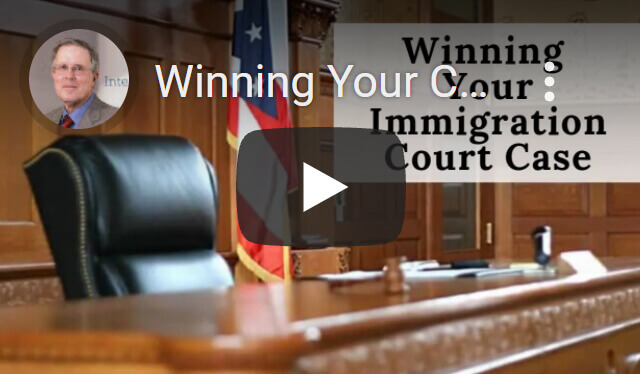The following is the INS Unlawful Presence Memo received from Pearl Chang (INS)
This is just to confirm that no advance parole is required of nonimmigrants who have changed status. As they travel outside the U.S., they will have to have a new visa in order to be admitted in the new nonimmigrant classification – there is no provision for advance parole for these cases or is required. I have not seen this posting on the internet before and will follow up on getting it corrected. Thanks for getting this to our attention.
November 22, 2000
INS Issues Foreign Travel Advisory for Aliens
With Pending Immigration Applications
The Immigration and Naturalization Service (INS) urges all aliens with pending applications for adjustment of status or change of nonimmigrant status to consult with an immigration attorney or an immigrant assistance organization accredited by the Board of Immigration Appeals before making any foreign travel plans.
Aliens who have applied to adjust status to that of permanent resident or change nonimmigrant status must obtain Advance Parole from the INS before traveling abroad (see questions and answers below). However, due to recent changes to U.S. immigration law, travel outside of the United States may have severe consequences for certain aliens who are in the process of adjusting their status or changing their nonimmigrant status. Such aliens may be found inadmissible, their applications may be denied, or both.
Client Reviews

Professional and Knowledgeable Law Firm
“I’ve had a decade of experience with Mr. Shusterman’s law firm. I used them for my immigration needs from H1 to citizenship. It is safe to say this is one of the most competent, professional and knowledgeable law firms. If there is a firm that can handle any possible immigration case routine or otherwise; then this is it.”
- D. Chen, Phoenix, Arizona
Read More Reviews
Zoom Consultations Available!
Under the Illegal Immigration Reform and Immigrant Responsibility Act of 1996, aliens who depart the United States after being unlawfully present in the United States for certain periods can be barred from admission, even if they have obtained Advance Parole. Those aliens unlawfully present in the United States for 180 days but less than one year are inadmissible for three years; those who are unlawfully present for more than one year are inadmissible for 10 years.
For more information, call the INS nationwide toll-free information service at 1-800-375-5283. Further information on Advance Parole can also be found on INS’ Web site at uscis.gov.
Advance Parole: Questions and Answers
Q1. What is Advance Parole?
A1. Advance Parole is permission for certain aliens, who do not have a valid immigrant visa, to re-enter the United States after traveling abroad. Such aliens must be approved for Advance Parole before leaving the United States. If they have not obtained Advance Parole prior to traveling abroad, they will not be permitted to re-enter the United States upon their return.
Q2. Who needs Advance Parole?
A2. Aliens in the United States who have:
• An application for adjustment of status pending,
• Been admitted as a refugee or have been granted asylum,
• Been granted benefits under the Family Unity Program,
• Been granted Temporary Protected Status,
• An asylum application pending, and/or
• An emergent personal or bona fide reason to travel temporarily abroad.
Note: Aliens holding valid H-1 (temporary worker in a specialty occupation) or L-1 (intra-company transferee) visas and their dependants who have filed for adjustment of status do not have to file for Advance Parole as long as they maintain their nonimmigrant status.
Q3. Who is not eligible for Advance Parole?
A3. Aliens in the United States are not eligible for Advance Parole if they are:
• In the United States without a valid immigration status,
• An exchange alien subject to the foreign residence requirement,
• The beneficiary of a private bill, or
• Under removal proceedings.
Q4. How does one obtain Advance Parole?
A4. In general, an alien must file INS Form I-131, Application for a Travel Document, complete with supporting documentation, photos and the $95 fee. Since filing procedures vary among INS District Offices, applicants for Advance Parole should contact their local INS office for specific directions.
Information on how to locate and contact your local District Office as well as copies of Form I-131 can be found on the INS Web site uscis.gov. Forms also can be requested using INS’ toll-free forms request line 1-800-870-3676.
Q5. Does Advance Parole guarantee admission into the United States?
A5. No, Advance Parole does not guarantee admission into the United States. Aliens who have obtained Advance Parole are still subject to the INS inspection process at the port of entry.
Q6. Can travel abroad still have severe consequences for certain aliens, even if they have obtained Advance Parole?
A6. Yes, due to changes to U.S. immigration law, travel outside of the United States may have severe consequences for certain aliens who are in the process of adjusting their status or changing their nonimmigrant status. Such aliens may be found inadmissible to the United States upon return and/or their applications for adjustment or change of status may be denied.
Under the Illegal Immigration Reform and Immigrant Responsibility Act of 1996, aliens who depart the United States after accruing certain periods of unlawful presence in the United States can be barred from admission, even if they have obtained Advance Parole. Those aliens who are unlawfully present in the United States for 180 days but less than one year become inadmissible for three years; those who are unlawfully present for more than one year become inadmissible for 10 years.
Aliens who have concerns about their admissibility should contact an immigration attorney or an immigrant assistance organization accredited by the Board of Immigration Appeals before making foreign travel plans.








